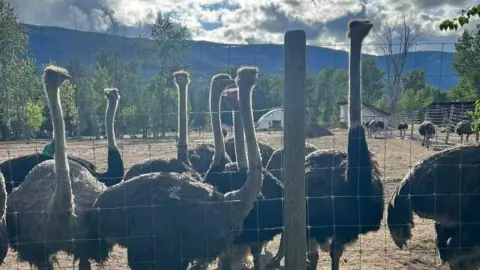Ostriches facing cull at Canada farm find unexpected allies
 Katie Pasitney
Katie PasitneyAn ostrich farm in Canada's British Columbia that is fighting to save almost 400 birds from a cull has caught the attention of Trump administration health officials Robert F Kennedy Jr and Dr Mehmet Oz.
The farm had confirmed cases of the avian flu in December and January, though it said there have been no instances of the virus since.
This month a Canadian court upheld the cull decision by the nation's food inspection agency, which said killing the birds was necessary to prevent the virus from mutating and to stop its spread.
On Friday, Kennedy appealed directly to Canadian officials, urging them instead to consider studying the ostriches for bird flu antibodies.
In a letter to Paul MacKinnon, president of the Canadian Food Inspection Agency (CFIA), posted to X, the US health secretary also offered full support for the National Institutes of Health and the Food and Drugs Administration's diagnostic testing and research efforts.
"The indiscriminate destruction of entire flocks without up-to-date testing and evaluation can have significant consequences, including the loss of valuable genetic stock that may help explain risk factors for H5N1 mortality," he said.
Avian influenza is also called H5N1, its current strain.
Kennedy's letter was co-signed by Jay Bhattacharya and Martin Makary, heads of the two US agencies.
Most recently, Dr Oz, the administrator for the US Centers for Medicare and Medicaid Services, offered to re-home the birds on his Florida ranch, a spokeswoman for the farm told CBC News. The farm rejected his proposal.
Katie Pasitney, the daughter of one the farm's owners told the BBC they turned down the offer because of Canadian quarantine orders but would reconsider if it was the only way to save the ostriches.
She urged President Donald Trump and Elon Musk intervene.
While the farm is still trying to stop the cull through the courts, Canadian officials have said they plan to move forward while declining to set a date.
"Allowing a domestic poultry flock known to be exposed to avian influenza to remain alive allows a potential source of the virus to persist," CFIA said this month.
"It would increase the possibility of reassortment or mutation, particularly with birds raised in open pasture where there is ongoing exposure to wildlife. This could also increase the human health risk."
- 'Unprecedented': How bird flu became an animal pandemic
- What is bird flu and how worried should I be about a pandemic?
Court records show Universal Ostrich Farms, based in the community of Edgewood, raises the birds for their meat and eggs and for antibody research. The farm said 398 ostriches face being killed. Ms Pasitney said the birds have been kept exclusively for research since 2020.
The farm had sought an exemption from the cull but CFIA said the birds did not meet the necessary criteria.
The outbreak began on the farm last December and killed about 70 ostriches over two months, according to court records.
It's part of an ongoing outbreak in the US and Canada. About 14.5 million birds in Canada have been affected by the virus, according to the CFIA.
Kennedy has a personal affinity for birds. He has previously spoken fondly about his love for falconry and about living with a pet emu named Toby. He also has two pet ravens.
US billionaire John Catsimatidis has also been a vocal advocate for the birds.
